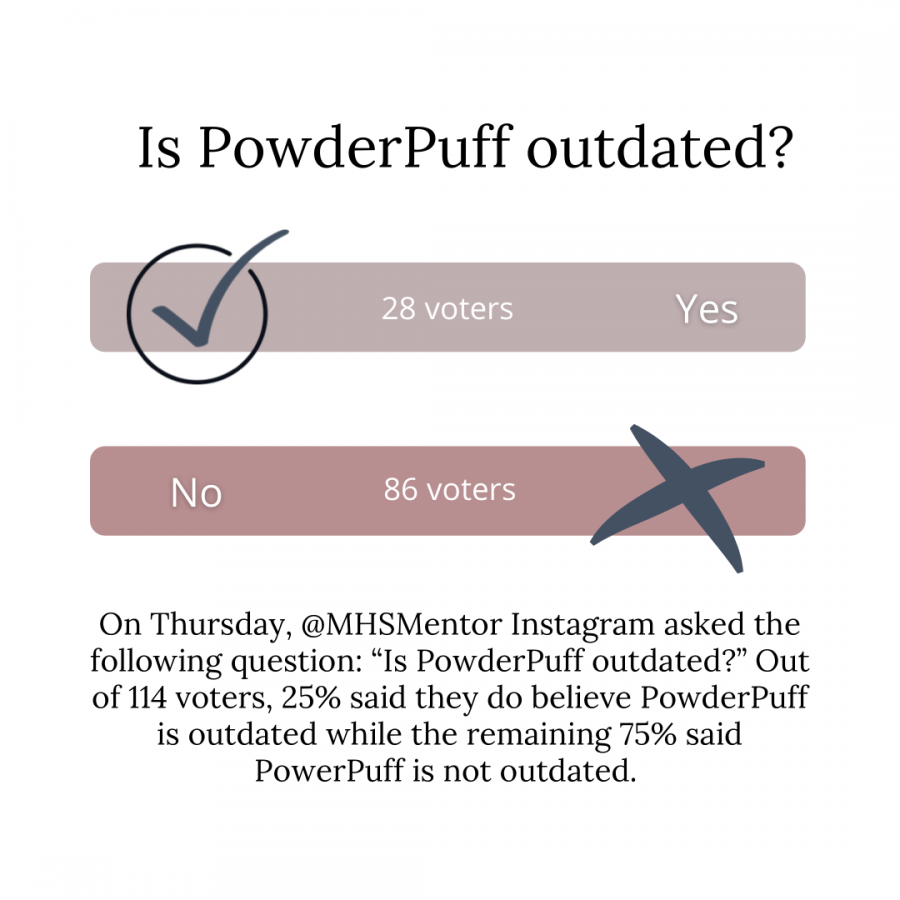PowderPuff not inclusive, outdated
Graphic by Julianna Poe
October 4, 2021
Homecoming is right around the corner, and with it comes PowderPuff. PowderPuff — an event where the girls and the boys switch places; girls play football, guys are the cheerleaders — began around the 1930s to ‘40s, with some photographic evidence of the game being played in 1931 at Western State Colorado University, and the first game recorded in 1945 at Eastern State Teachers College in Madison, South Dakota. The name “PowderPuff” came from the makeup tool that the women used to apply makeup.
The concept of PowderPuff is that football, a traditionally male sport, is played by the women, although the girls play touch football instead of tackling. The boys also participate, becoming the cheerleaders during the PowderPuff game, often wearing the cheerleading uniforms.
The idea brings into question whether the event is outdated. It’s been well established that there are more than two genders, and mocking femininity isn’t acceptable. There is no denying that feminine men do exist. However, PowderPuff has instilled a sense of mockery and burlesque towards women as well reinforcing the gender binary.
The Mentor Editorial Board believes that ideas surrounding PowderPuff cause harm and the event needs to be more inclusive towards everyone.
In the past, it was acceptable to mock femininity and ridicule feminine men. The outfits, typically knock off versions of cheer or dance costumes, only continue to mock femininity and insult those who like to wear more feminine clothing. These outfits are expressions of femininity and people who wear feminine clothing are often considered “weaker” and more sensitive than masculine people, especially when it comes to feminine and masucline men. Boys wearing the outfits inherently contribute to that idea as they participate.
PowderPuff also ridicules transgender and gender-noncomforming people. Trans people have a hard time being accepted and are often shamed for wearing what they want. Trans women bear the brunt of this, dealing with transphobia on a daily basis, only to see cisgendered high school boys come in and wear “feminine” clothing without being ridiculed and actually being seen as humorously entertaining.
Events like PowderPuff inherently reinforces the patriarchy, over-exaggerating and objectifying women and the clothing they wear. Take into account the amount of sexism within schools, as the dress code clearly targets girls. Would the school allow girls to dress like that and do the dance moves boys have done in the past? There has been an issue with the dress code since it was created, and PowderPuff allows for the continuous favoring of men and letting them wear whatever clothing they want because the female body is seen as sexual and in need of being covered up while the male body isn’t.
Another issue is that the gender binary and norms are once again reinforced with PowderPuff, not only in the clothing, but in the event itself. The binary switch is not inclusive and focuses only on cisgender girls and cisgender boys, completely ignoring the nonbinary students. Girls play the “boys” sport, boys participate in a “girls” sport. The expected norm of “boys play rough sports, so let’s lighten it for the girls” is reinforced as well in playing touch football. What was intended to be seen as empowerment for women only fueled the idea that they are delicate people who can’t play as rough as the boys.
A simple way to fix PowderPuff is to open it to everyone. Reinforcing the gender binary is hurting the nonbinary students within the school. Let everyone play in the football game.
Changing the cheer aspect of PowderPuff is also effective in reducing the objectification and belittlement of AFAB, assigned female at birth, people. Make the dance inclusive to all, not just the cisgender boys who find it humorous to mock femininity and the LGBT+ community. The group could practice a cheer routine so that they are actually cheering, not just dressing and dancing inappropriately.
Creating a more inclusive event would ensure that nonbinary people are part of it and recognised within the school, take a step into progressive feminism and dismantle the sexist ideologies that fuel the school and its rules.



Karlis • Jul 30, 2023 at 5:31 am
Ever think that maybe the boys get this one chance to be themselves…
Samuel Smith • Apr 8, 2023 at 12:26 am
I think the results of the poll say it all. You’re completely out of touch and out of step with the majority of society.
“Well established that there are more than two genders”
Not in America and Canada. People like you keep trying to push that absolute garbage and society simply disagrees. Get a clue.